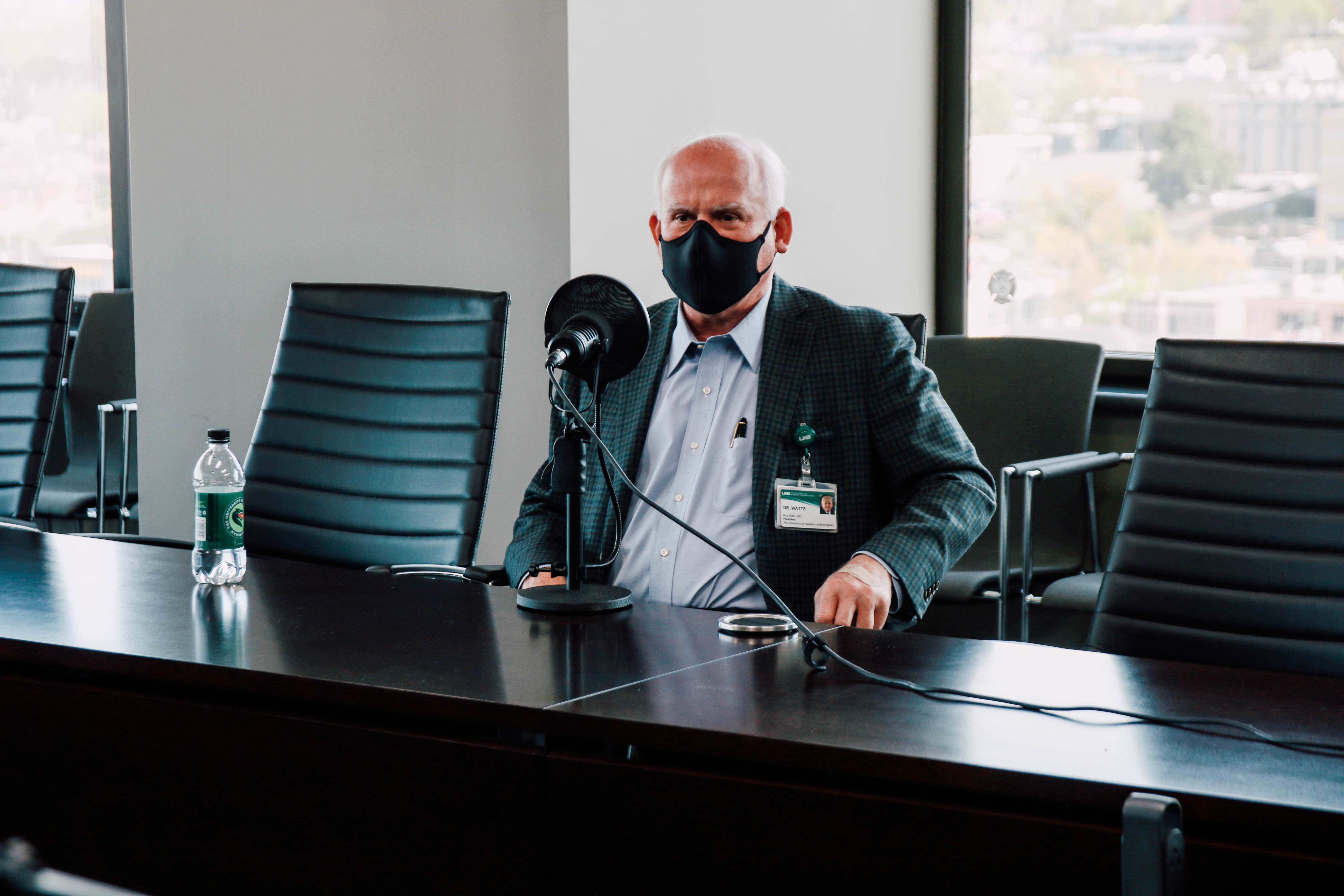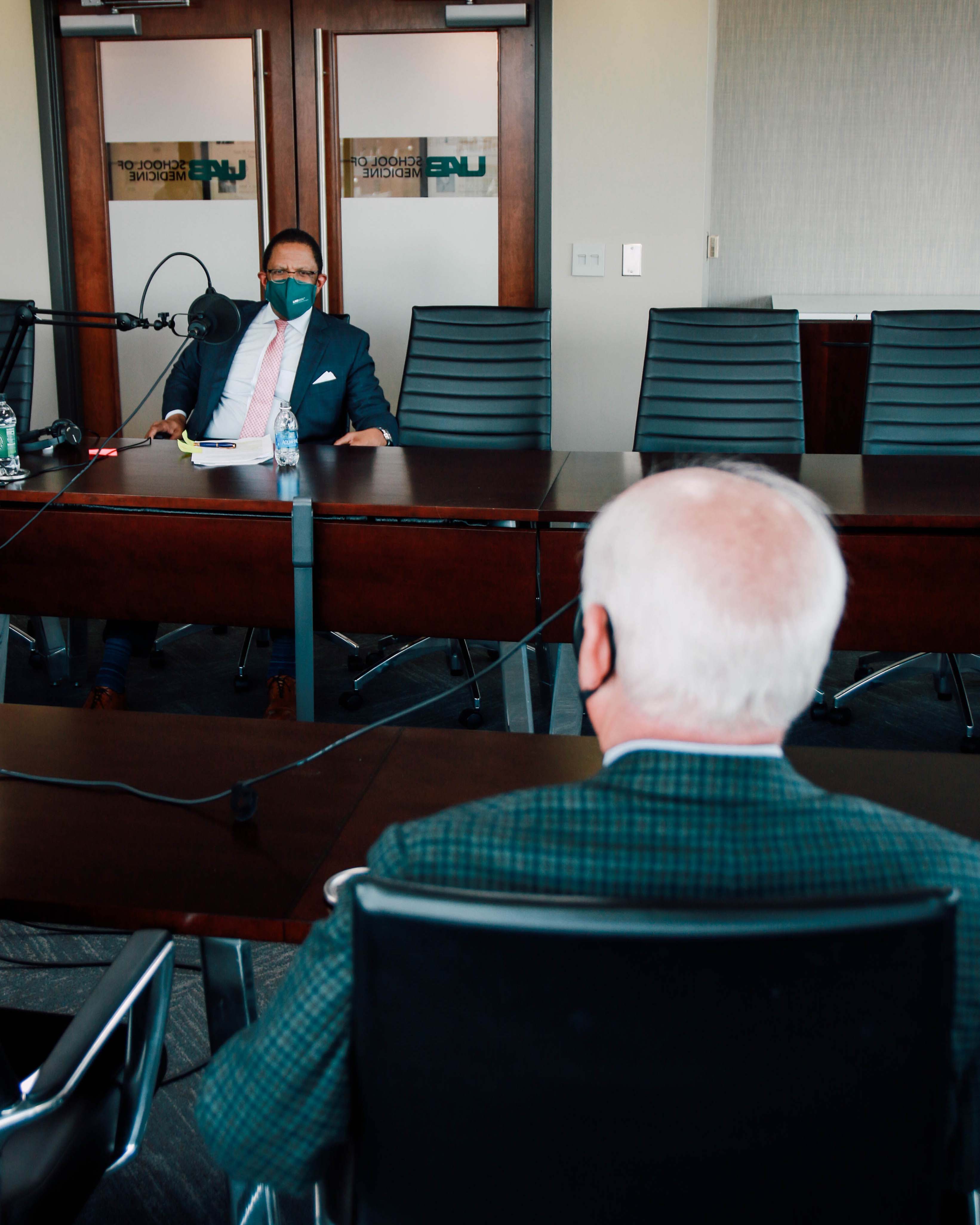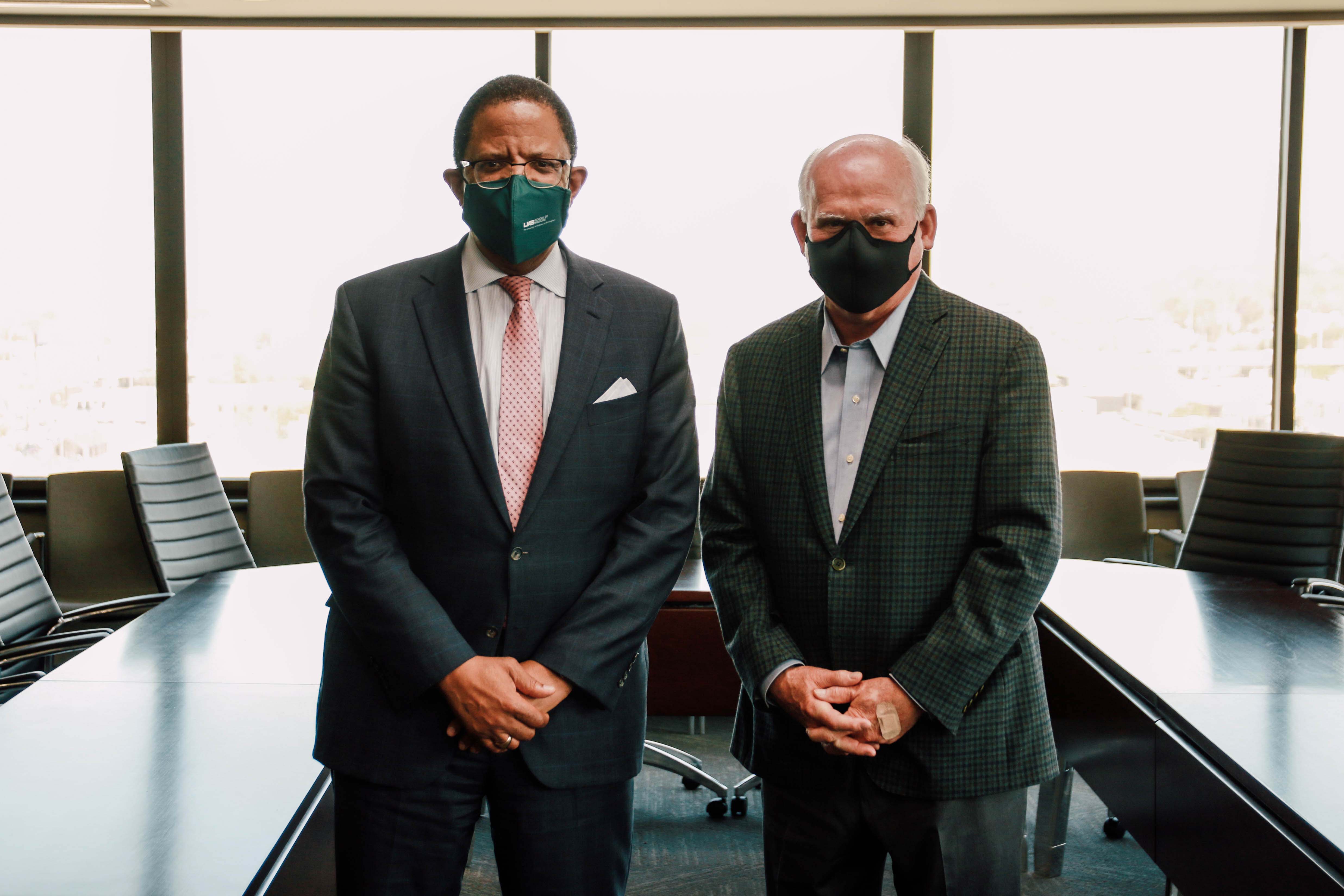 The nation has been through a great deal in the past year. From the COVID-19 pandemic to a tumultuous election season and unwavering cries for racial justice, no other year in our lifetime matches the turbulence that 2020 brought.
The nation has been through a great deal in the past year. From the COVID-19 pandemic to a tumultuous election season and unwavering cries for racial justice, no other year in our lifetime matches the turbulence that 2020 brought.
Leadership at UAB began preparing for the pandemic early on, and pivoted to safety models—like the Limited Business Model—within days. Selwyn Vickers, M.D., FACS, dean of the School of Medicine, says UAB responded strongly and stepped up in a very difficult situation.
From PPE shortages and robust telehealth needs to refining the institution’s financial model, every part of the UAB enterprise was impacted by the pandemic.
In the midst of it all, UAB was named the number one best large employer in the country by Forbes. This honor showcased the resilience and unity of UAB’s faculty, staff, trainees, and students—complimenting their tireless efforts and recognizing robust career fulfillment.
In the most recent installment of ‘The Checkup’ podcast, Vickers sits down with Ray Watts, M.D., president of UAB, to reflect on the earliest days of the pandemic, ways the institution handled the crisis, and how UAB was able to fulfill core mission areas during an unparalleled year.
The first sign of a pandemic
Before COVID-19 arrived in the U.S., Watts says he personally researched COVID-19 as much as possible—from both a medical perspective and a community impact perspective. He knew early on that the country was facing “a tsunami.”
In February 2020, Francis Collins, Ph.D., director of the National Institutes of Health, visited UAB’s campus, where he delivered a special lecture to a crowded audience at Margaret Cameron Spain. His presentation—packed with scientific COVID-19 information—marked the last time the School of Medicine and others from across UAB gathered in one place.
In the following days, it became clear to leadership that they needed to jump into action.
“The evolution and unfolding of that first week gave us insight, and allowed us to mobilize our own resources,” Vickers says.
In the course of a short weekend, leadership developed a plan to get as many people off campus and into their homes as possible. Daily command center meetings were established, and leaders from every corner of UAB—the Health System, School of Medicine, School of Public Health, UAB Medicine, and so many more—were assembled to use their talent and knowledge to protect the UAB and surrounding communities.
“We relied on our infectious disease experts, our public health experts, and our medical experts,” Watts says. UAB trusted scientists and experts from the beginning, which—according to Vickers and Watts—made all the difference.
Watts explains that safety measures, such as social distancing, mask-wearing, and personal hygiene, were imperative to the UAB community, even in the earliest days. Watts and Vickers both describe the campus and hospital compliance as upholding UAB’s shared values “in action.”
“Everybody did their part,” Watts remembers. “We had to become leadership that people could rely on.”
In retrospect, Watts explains that UAB did not intend to follow mainstream ideas, but choose to do what “we thought was right by utilizing technology, innovation, and collaboration. For our state, we needed to lead.”
 Staying united
Staying united
When it comes to key operational areas of UAB campus and hospital, every employee sprang into action where they could.
“Our resilience is second to none. Everybody was so unselfish.” Watts says that when called to duty, employees did their duty and more. “Everybody worked selflessly together to make sure we had the best evidence-driven, decision-making process possible.”
Individuals and groups representing mission areas of the School of Medicine and beyond rallied to do their part when the COVID-19 pandemic struck, and they have continued to do their part all year.
Below is an overview of a few critical areas impacted by COVID-19 that Watts and Vickers discuss in the latest podcast.
RESEARCH
When it comes to the mission area of research, Watts reminisces on a board meeting in the early days of the pandemic with corporate executives in the community. He recalls discussing the need to mobilize research immediately, and in just 20 days, over $1.1 million was raised to help fund the Urgent COVID-19 Clinical Research and Laboratory Research Fund.
Over 52 applications were submitted to the request for applications for Urgent COVID-19 dollars and 14 were selected for awards to begin research. Now, groundbreaking discoveries have been made and impactful research is ongoing.
TESTING & TRACING
Likewise, pathology and laboratory medicine teams also jumped into action. During a time when every medical office and hospital in the country was trying to get testing kits, UAB’s pathology labs learned how test for COVID-19 on their own.
“Even without leadership suggesting it, pathology learned how to test for COVID very quickly,” Watts says. “They rose to the occasion.”
Plus, a few months after the pandemic began, UAB launched GuideSafe™ HealthCheck—which put UAB on the map for one of the most comprehensive higher-education entry plans in the country.
Vickers says that HealthCheck has been essential to having students return to campus, and has provided an opportunity to help other campuses across the UA System and all Alabama public and private colleges and universities.
Watts and Vickers agree that when it comes to testing and tracing, working together has been key. “Innovation and collaboration are the hallmarks of UAB. Let no problem go unsolved,” Watts says.
TEACHING & EDUCATION
Moreover, educators at UAB were among the first to transition their work to an online, virtual format. UAB pivoted from in-class sessions to remote learning in one, short week. Watts says that UAB invested millions in equipment to adapt the remote model.
Vickers and Watts concur that investing in new education models was critical to adapting to the pandemic. “Our educational mission is to train the next generation of leaders. The power of education lies in our individual lives and in our communities.”
PATIENT CARE & FRONTLINE WORK
In the same way, changes in patient care were critical at the onset of the pandemic. While always committed to excellent patient care, UAB stopped elective care due to the possibility of personal protective equipment (PPE) shortages for frontline health care workers.
Watts says, “It was late March/early April when we shut the hospital down, other than emergencies and COVID-19. It really projected to be a tremendous revenue reduction.”
Frontline workers at UAB were essential to COVID-19 missions. Due to the concern about PPE shortages and other lifesaving patient equipment, UAB stepped up to help acquire PPE from every direction; research labs donated face masks. Experts considered how to use innovation and design to create new PPE.
As well, health care at UAB reaches across the state. Watts explains that it was imperative to work with hospital affiliates. “Not everybody can come to Birmingham,” Watts says, so telehealth and other community outreach efforts were required.
The need for telehealth grew significantly in the earliest days of COVID-19. On April 29, 2020, the hospital saw 1,400 patients with a video visit—a 350-fold increase in video visits. Led by Eric Wallace, M.D., medical director of Telehealth, UAB rapidly trained health care providers on telehealth in just a few weeks.
 Looking forward
Looking forward
Watts and Vickers agree that UAB gracefully pulled through the past year due to collaboration and willingness.
“Everybody worked together to rise to the occasion," Watts remembers. "It is remarkable now, when you look back on that, how deep was that serious valley and how challenging it was. But health care workers just worked themselves tired to the bone; they never complained. They were always willing to do more if necessary. The resilience of the UAB team and family–it’s remarkable.”
Now that vaccinations are ramping up across Alabama, and all residents aged 16 and older are eligible, Watts sees UAB moving ahead rapidly. Both Vickers and Watts are excited for future collaboration and unity across UAB.
Watts says, “In every part of our mission, we broke records in 2020.” Research funding topped $638 million, student enrollment drastically increased, and UAB served our communities more vigorously than ever. Vickers adds that he is excited about the future: “If we could do this well during a pandemic, what can we do past the pandemic?”
“Let gratitude fuel us. There’s no limit to what we can do,” Watts says.
Other topics covered in this episode of ‘The Checkup’ include UAB’s response to racial justice in 2020, how Watts and Vickers maintained their wellness through the hardest moments of the pandemic, and how the university’s financial model was impacted by COVID-19.
To listen to the full podcast, click here. You can also find the podcast on Apple or Spotify.
